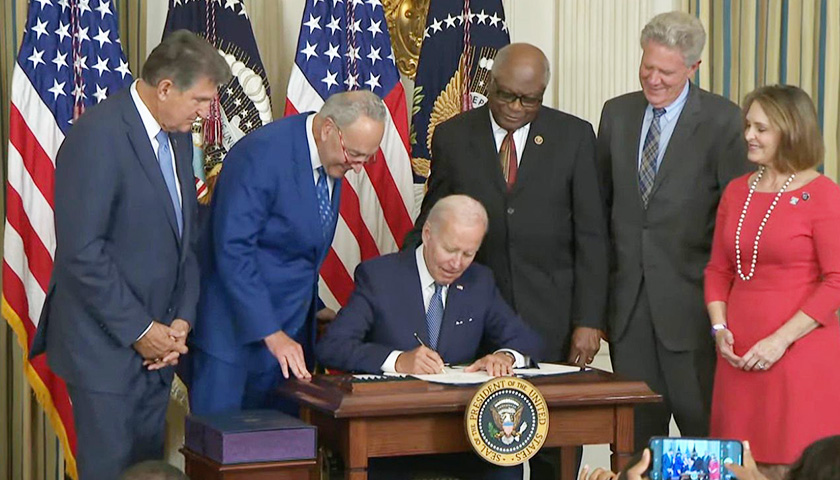by Casey Harper
President Joe Biden signed a $740 billion spending package into law Tuesday, the final step for the green energy, health care and tax hike bill after months of wrangling and controversy, in particular over the legislation’s hiring of 87,000 new IRS agents to audit Americans.
Democrats at the White House Tuesday touted the bill’s deficit reduction of $300 billion over the next decade. The bill includes several measures, including a $35 per month cap on insulin copays, an extension of Affordable Care Act subsidies, and authorization for Medicare to negotiate certain drug prices.
“With this law, the American people won, and the special interests lost,” Biden said. “This administration began amid a dark time in America…and yet we’ve not wavered. We’ve not flinched, and we’ve not given in. Instead, we’ve delivered results for the American people.”
The bill also spends $386 billion on clean energy and climate change initiatives. That funding includes more than $270 billion in tax credits for manufacturing wind turbines, solar panels, batteries, and other electric vehicle and green energy technology.
“We didn’t look back, we looked forward,” Biden added.
The bill also includes a 15% minimum income tax on companies with over $1 billion in revenue.
Critics blasted the bill, saying that cutting pharmaceutical companies profit potential will disincentivize investment in new medicine. Critics also argued that more federal spending means more waste and handouts for large corporations.
“Biden’s inflation bill: $7,500 electric vehicle tax credit,” said Daniel Turner, head of the energy workers advocacy group, Power the Future. “Ford: Raised price of electric vehicles by $8,500. Way to go, Joe.”
One of the bill’s most controversial provisions is $80 billion in federal funding to hire an army of 87,000 IRS auditors, more than doubling the agency’s size. The Biden administration has claimed the increased auditing will more than pay for the $80 billion investment and help pay for the bill.
As The Center Square previously reported, experts say over 30 million small businesses will be in the crosshairs of those audits.
“There is no doubt that boosting IRS audit capabilities through a vast increase in the hiring of 87,000 new staff focused on this effort will hit small businesses the hardest,” said Karen Kerrigan, president and CEO of the Small Business and Entrepreneurship Council. “The tax data shows that it is small businesses of moderate means, not ‘the wealthy,’ that are targeted most frequently.”
– – –
Casey Harper is a Senior Reporter for The Center Square the Washington, D.C. Bureau. He previously worked for The Daily Caller, The Hill, and Sinclair Broadcast Group. A graduate of Hillsdale College, Casey’s work has also appeared in Fox News, Fox Business, and USA Today.
Photo “Joe Biden Signs the Inflation Reduction Act” by Protect Our Care.








